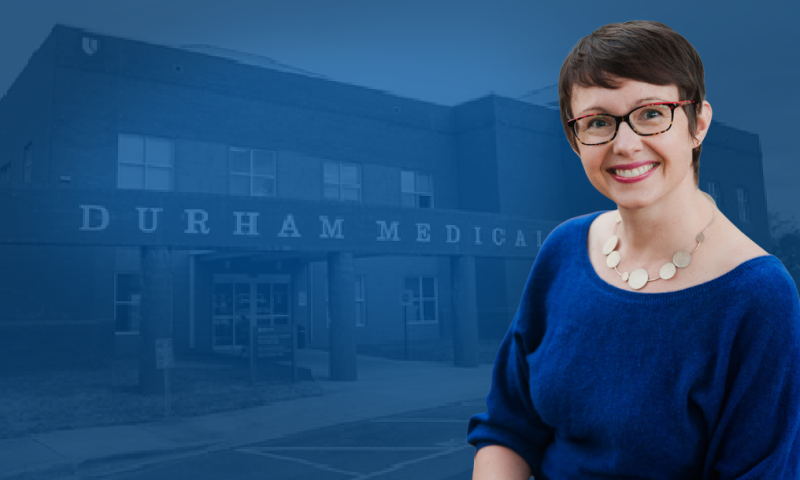
Over a year ago, in August 2019, Katherine Henderson began her chaplain internship at the Duke Outpatient Clinic (DOC). This was a new idea that started with the vision of DOC Medical Director, Lynn Bowlby, MD, in response to the high levels of trauma, loss and systemic injustice faced by DOC patients.
"My role is to receive the story of the patient’s suffering, in their own words," says Henderson. "I work within each person’s particular worldview to contextualize their struggles and reinforce their sources of spiritual and emotional strength."
"My role is to receive the story of the patient’s suffering, in their own words. I work within each person’s particular worldview to contextualize their struggles and reinforce their sources of spiritual and emotional strength."
Chaplain Katherine works in close partnership with DOC providers and social workers to identify patients who are in spiritual crisis, as characterized by symptoms such as intense loneliness, fear, guilt, anger, grief and despair. Though she provides many services at the clinic, one of the most popular has been the DOC Grief & Spirituality Group, which focuses on peer support and skills for coping with loss.
Grief Support Group
The group met once a week in-person until COVID started, and then went virtual in the Fall of 2020. Though Henderson wasn't sure of the outcome of the virtual sessions at first, she was pleasantly surprised to find just as powerful connections forming between group members in the online format.
"We create a container, a safe meeting place where people can find validation and connection with other people who are suffering in similar ways," explains Henderson.
Continuing Chaplain Work at DOC
Henderson's original internship with the DOC ended in April of 2020, but the team was able to secure funding so she could return to continue her services and start on a new research project looking at the model of outpatient chaplaincy and how it can support Advance Care Planning.
"The culture of the DOC is hugely influential in facilitating new partnerships and research efforts. Collegiality, authenticity and interdisciplinary collaboration are all key ingredients that have allowed this project to thrive."
 Teamwork Makes the Dream Work
Teamwork Makes the Dream Work
Henderson is grateful for the ongoing partnership of her project team members: Dr. Lynn Bowlby, Rev. John Oliver (Duke’s Director of Chaplain Services), DOC social workers Jan Dillard and Elissa Nickolopoulos, and Dr. Patrick Hemming.
"I am passionate about providing spiritual care for people —that’s why this clinic population is so important to me. It is a privilege to receive their stories of love, loss, struggle and resilience."
Clinical Pastoral Education
In addition to their graduate theological training, board-certified professional chaplains must complete a minimum of four 400-hour units of Clinical Pastoral Education (CPE). CPE is a rigorous combination of hands-on practice, clinical supervision, and academic study that requires students to examine and integrate their personal history and belief system in order to offer patient-centered interfaith spiritual care.
Henderson further credits her two CPE educators at Duke—Biju Chacko and Peggy Gold—for their willingness to expand their chaplaincy supervision into this novel outpatient setting.
Chaplain Katherine is completing her fourth unit of Clinical Pastoral Education at Duke this spring, and will graduate with her Masters of Divinity in May.